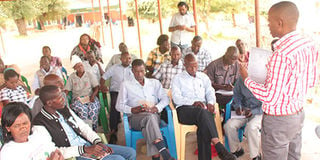Kitui residents in the dark over proposed limestone mining

Kelvin Muthui (right) a Kitui official of Caritas, a Catholic NGO, speaks to residents of Ngaaie in Mwingi during a training on mining. There is still uncertainty over the future of limestone mining in Ngaaie following the sale of the Athi River Mining Company. PHOTO | BONIFACE MWANIKI | NATION MEDIA GROUP
What you need to know:
- ARM was placed under administration in August 2018 and later sold to the National Cement Company.
- Martha Muthui, a woman leader from Ngaaie, claims that there wasn't enough public participation.
- She says the land should have been leased to the company in order to give locals maximum benefits.
There is still uncertainty over the future of limestone mining in Ngaaie, Mwingi, in Kitui County following the selling of Athi River Mining Company (ARM).
The company had acquired mining rights in the area before it was placed under administration in August 2018 and later sold to the National Cement Company.
ARM had acquired mining rights in Ngaaie way back in 2013 and had bought huge pieces of limestone and clinger-rich land before it went into financial instability and was placed under administration.
STILL IN THE DARK
Following this transition, residents of Ngaaie are still in the dark over who should pay them the remaining money for their land.
ARM had agreed to buy land in Ngaaie for Sh400,000 per acre but had only paid Sh150,000 by mid-last year.
The purchase of land by ARM was also not agreed upon by all residents who believe that they were short-changed in the process.
The residents now allege that the liaison committee which they had elected then, led by Mwingi North MP Paul Nzengu, had been compromised by the mining company.
NO PUBLIC PARTICIPATION
Martha Muthui, a woman leader from Ngaaie, claims that there wasn't enough public participation in the whole process and that the purchase of land was agreed upon by a few members of the community led by the liaison committee.
“Our community was ambushed into mining issues without proper public participation or sensitisation. That’s why most members of the public opted to sell their mineral-rich land at a throw-away price,” said Ms Muthui.
According to her, the purchase of the land by ARM left residents more vulnerable and in total darkness about their future.
LEASE LAND
She says the land should have been leased to the company in order to give locals maximum benefits.
“It would have been better if we would have leased our land instead of selling it. This would have given our community a chance to participate in the operations of the company and to make decisions on their welfare,” she added.
She also complained that no environmental impact assessment was done on their land and many people whose land was not included in the affected areas might suffer in future if mining starts.
SECRECY
Elijah Mutembei, another resident, says that there is a lot of secrecy in the whole process as locals have not yet been updated on the selling of ARM to a new investor and they do not know whether the new company is aware of the agreement they made before the sale.
“The process is mired in secrecy as the public is never informed on the progress made by the company and when mining is likely to start,” said Mutembei.
Mr Mutembei said there was no clear plan of re-location and resettlement when mining starts, hence most residents risk being rendered homeless eventually.
“Without a clear re-location or resettlement plan, our community was left vulnerable and surviving under the mercy of the mining company,” he said.




